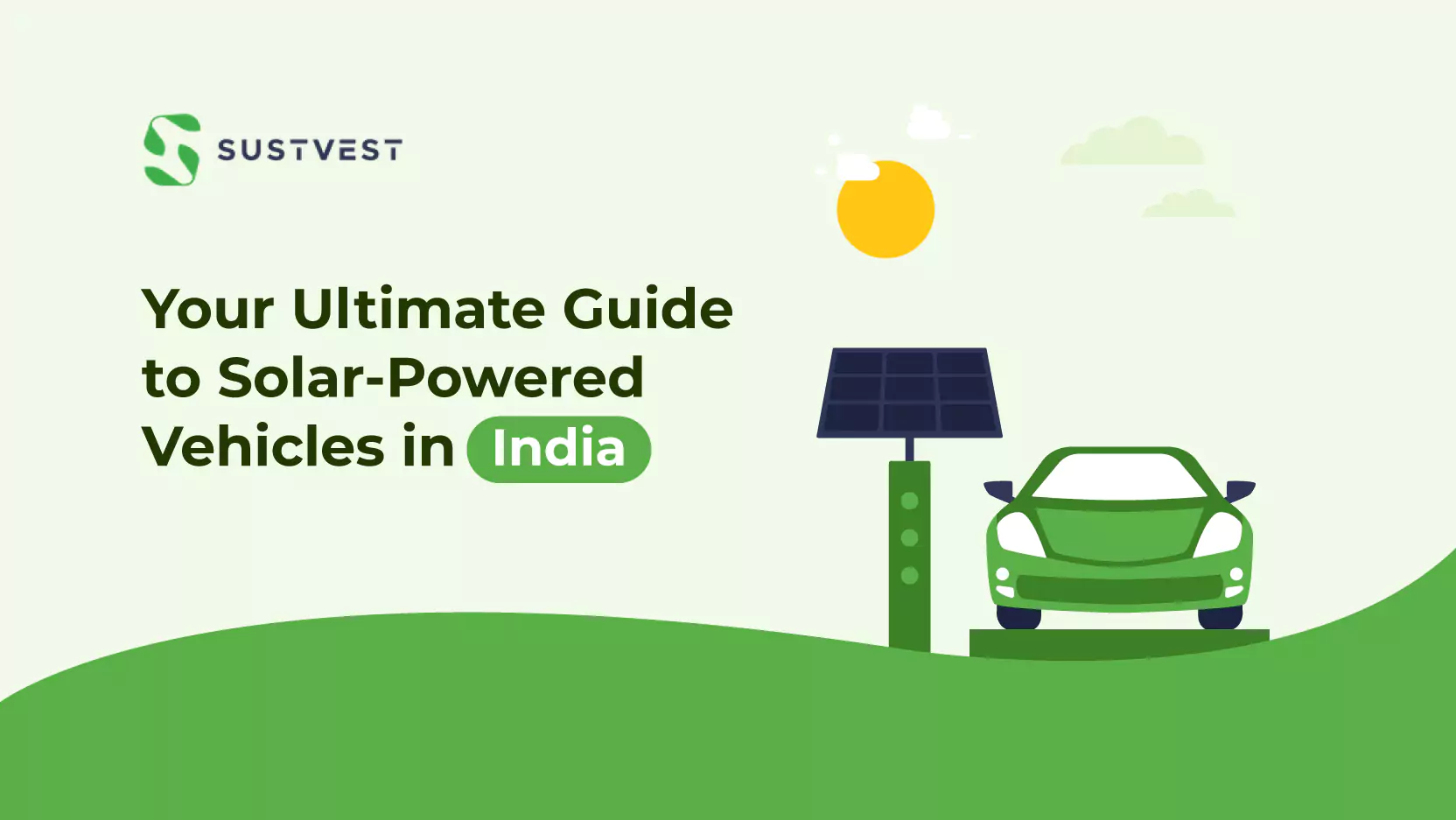You have already heard about electric vehicles. The global EV industry is expanding at a rapid rate. Significant infrastructural investments and favorable government policies have boosted the market for electric vehicles. The massive strides towards renewable energy are bringing innovative transformation in the automobile sector. However, this is just the beginning.
The next decade will see the rise of solar-powered vehicles in India. Moving beyond solar panels, solar-powered cars will be out on the streets. Let’s delve deeper into the mechanics of solar vehicles and try to understand the upcoming SV industry.

How do solar vehicles work? – The Technology Behind SVs
The number of solar-powered vehicles in India will increase drastically in the next few years. As per estimates, the solar vehicle market will reach $689 billion in 2027. When the future belongs to solar, it becomes crucial to understand the innate technology of the industry.
Solar-powered electric vehicles utilize the working principles of solar panels. The built-in photovoltaic cells convert solar power into electricity that can be stored in batteries. The batteries, in turn, can act as fuel for running the vehicles. But, have solar-powered cars been invented? The 2023 Auto Expo in Greater Noida introduced India’s first solar car, EVA.
EVA is similar in design to a Tata Nano and has been developed by the Pune-based startup, Vayve Mobility. It is a battery-driven single-door car with a 2+1 seating capacity. There is a solar roof panel that can be fitted on top of the car. The commercial launch is expected to begin by early 2024. Solar charging stations for electric cars will be set up across different parts of the country.
Now, let’s tackle the recurring questions of solar-powered vehicles in India one by one.
Are Solar-Powered Cars the Future?
The concept of solar-powered vehicles in India has sparked considerable interest and debate, raising the question: Are solar-powered cars the future? The answer lies in the growing global awareness of environmental concerns and the need for sustainable transportation solutions.
Solar-powered cars, equipped with photovoltaic cells that convert sunlight into electricity, represent a promising step towards reducing the carbon footprint of the automotive industry.
List of Solar Power Companies
- Tata Motors: Tata Motors has been a key player in the Indian automotive industry and has shown interest in electric and solar-powered vehicles.
- Mahindra Electric: Mahindra Electric, a subsidiary of Mahindra & Mahindra, has been actively involved in the development and promotion of electric vehicles. They are exploring solar technologies for their electric vehicles.
- Ashok Leyland: Ashok Leyland has ventured into the electric vehicle space and has shown interest in sustainable transportation solutions, including solar power.
- Hero Electric: Hero Electric is known for its electric two-wheelers, and it has been exploring innovations in electric and solar-powered mobility solutions.
- Luminous Power Technologies: Luminous, known for its expertise in power and energy solutions, has been involved in exploring solar-powered electric vehicles.
Scope of Solar Power in India
India, with its burgeoning population and increasing energy demands, is actively exploring renewable energy sources, and solar power is at the forefront of this transition.
The scope of solar power in India extends beyond residential and commercial applications to the transportation sector. The Indian government has been proactive in promoting solar energy, offering incentives and subsidies to encourage the adoption of solar-powered vehicles.
Difference Between an EV and a Solar Vehicle?
It’s essential to differentiate between electric vehicles (EVs) and solar vehicles to understand their distinct contributions to sustainability. Here is a table sheet representing the crucial differences between the two.
| Feature | Solar Car | Electric Vehicle (EV) |
| Power Source | Directly powered by solar panels on the vehicle. | Powered by electricity stored in rechargeable batteries. |
| Charging Method | Charges continuously when exposed to sunlight. | Requires plugging into an electrical charging station. |
| Range | It is limited by the efficiency of solar panels and available sunlight. | Range depends on battery capacity and charging infrastructure. |
| Dependency on Grid | Less dependent on the electrical grid, especially for short trips. | Requires access to the electrical grid for charging. |
| Energy Storage | May have a small onboard battery for energy storage. | Relies on a larger battery pack for energy storage. |
| Charging Time | Can potentially charge while in motion (sunlight permitting). | Charging time depends on the charger type; typically takes longer than refueling a traditional car. |
| Environmental Impact | Generally lower emissions as it utilizes solar energy directly. | Lower emissions compared to traditional vehicles but may still depend on grid energy sources. |
| Cost of Infrastructure | Requires less infrastructure for charging stations. | Requires a network of charging stations for widespread use. |
| Adaptability | Suited for regions with ample sunlight. | Adaptable to various regions but dependent on charging infrastructure. |
| Technology Maturity | Still in the experimental stage with limited commercial availability. | EV technology is more mature, with a broader range of commercially available models. |
| Flexibility of Use | Well-suited for short commutes and local trips. | Suitable for various driving needs, including long-distance travel. |
Is a Solar-Powered Car a Good Alternative to an Electric Car?
The comparison between solar-powered cars and electric cars is nuanced. Solar-powered cars offer the advantage of harnessing energy directly from the sun, potentially extending their range and reducing the need for frequent charging.
However, challenges such as limited sunlight hours, variable weather conditions, and the efficiency of current solar technology pose obstacles to widespread adoption. Electric cars, on the other hand, benefit from a more established charging infrastructure but are not completely emissions-free if the electricity is derived from non-renewable sources.
What Is the Importance of Solar Power?
Understanding the importance of solar power is crucial in the context of mitigating climate change and transitioning towards a sustainable future. Solar power is a renewable, clean energy source that can significantly reduce greenhouse gas emissions.
Embracing solar-powered vehicles in India aligns with global efforts to combat air pollution, reduce dependence on finite fossil fuels, and create a more environmentally conscious society.
Now, let’s resolve the frequently asked questions for solar-powered vehicles in India.
FAQs – Solar-Powered Vehicles in India
What exactly are solar-powered vehicles?
Solar-powered vehicles are vehicles equipped with photovoltaic cells that convert sunlight into electricity. These cells are integrated into the vehicle’s design, typically on the roof, and can provide power to either supplement the vehicle’s traditional power source or directly propel the vehicle.
How do solar-powered cars work?
Solar-powered cars work by harnessing energy from sunlight using photovoltaic cells. These cells convert sunlight into electricity, which can be used to charge the vehicle’s batteries or power auxiliary systems. The electricity generated is stored in a battery and can be used to drive the vehicle or to operate various vehicle functions.
Are solar-powered cars feasible in a country like India with variable weather conditions?
While India does have variable weather conditions, solar-powered vehicles can still be viable. Solar technology has advanced, and these vehicles can generate power even on cloudy days. Moreover, since India receives a substantial amount of sunlight throughout the year, solar-powered vehicles can operate effectively in most parts of the country.
How far can a solar-powered car travel on a single charge from solar panels?
The range of a solar-powered vehicle depends on various factors, including the efficiency of the solar panels, the vehicle’s design, and the weather conditions. In general, solar panels can add a few extra miles to a vehicle’s range per day, making them a valuable supplement to the traditional power source.
Are solar-powered cars in India eligible for government incentives or subsidies?
The Indian government is actively promoting solar energy and offers incentives and subsidies for various renewable energy initiatives. Depending on the state and the specific vehicle, there may be subsidies available for solar-powered vehicles.
It’s essential to check with local authorities or the vehicle manufacturer for information on available incentives.
Can solar-powered vehicles in India be charged like electric vehicles (EVs) using charging stations?
Solar-powered vehicles generate their electricity from sunlight, so they do not need traditional charging stations like EVs. However, some solar-powered vehicles may have the option to charge from external power sources, making them versatile and suitable for a variety of scenarios.
Conclusion:
Sustainable transportation solutions will be key to tackling the issue of climate change. The gradual launch of solar-powered vehicles in India will see the rise of big solar startups paving the way for a sustainable and ecologically rich future.
While challenges persist, advancements in technology and a growing commitment to renewable energy sources offer hope that solar-powered cars become a reality and viable option for eco-conscious commuters. As the world moves towards cleaner and greener alternatives, get in touch with Sustvest to learn about sustainable energy investments.
Also read: Future of Solar Energy in India.

Founder of Sustvest
Hardik completed his B.Tech from BITS Pilani. Keeping the current global scenario, the growth of renewable energy in mind, and people looking for investment opportunities in mind he founded SustVest ( formerly, Solar Grid X ) in 2018. This venture led him to achieve the ‘Emerging Fintech Talent of the Year in MENA region ‘ in October 2019.




